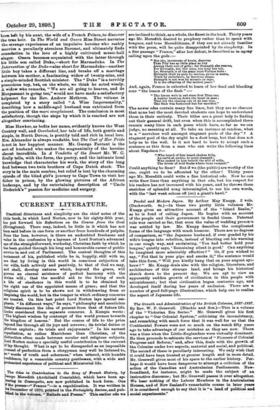CURRENT LITERATURE.
Practical directness and simplicity are the chief notes of the tittle book, in which Lord Norton, now in his eighty-fifth year, has put forward his Reflections on the Course from the Goal (Rivingtons). There may, indeed, be little in it which has not been said before in one form or another from hundreds of pulpits. None the less, however, is there an undoubted freshness and value in the confession by a layman of Lord Norton's advanced age of the straightforward, workaday, Christian faith by which he has been guided through his long and honourable career of public service in and out of Parliament. The central thoughts of this testament of his, published while he is, happily, still with us, are that by living in this world in conscious subjection of oar wills, both actively and passively, to that of God we may, and shall, develop natures which, beyond the grave, will pursue an eternal existence of perfect harmony with the divine will ; that the needful aid to the living of such a life of obedience in this world is to be obtained by the right use of the appointed means of grace; and that the religious spirit is to be shown not in withdrawing from or despising the world, but in the temper in which ordinary concerns are treated. On this last point Lord Norton lays special em- Phasis. "In different ways," he says, "philosophy and asceticism falsely disconnect the idea of present from that of future life. Locke considered them separate concerns. A Kempis wrote : 'The highest wisdom by contempt of the world presses towards the kingdom of heaven.' But the course of life to the prize beyond lies through all its joys and sorrows ; its trivial duties or glorious exploits ; its trials and enjoyments." In his earnest repudiation, as rather Manichean than Christian, of the distinction often made between secular and religious subjects, Lord Norton makes a specially useful contribution to the current of thought. What is apt to be disregarded as an impossible counsel of perfection from a clergyman may well be listened to, " words of truth and soberness," when uttered, with humble nfidence, by a venerable country gentleman, with a wide and retracted experience of political and Ministerial life.






































 Previous page
Previous page